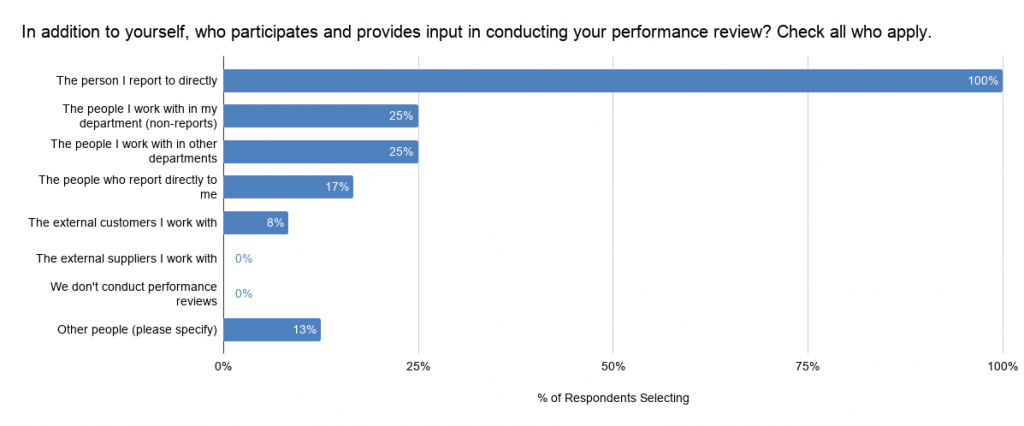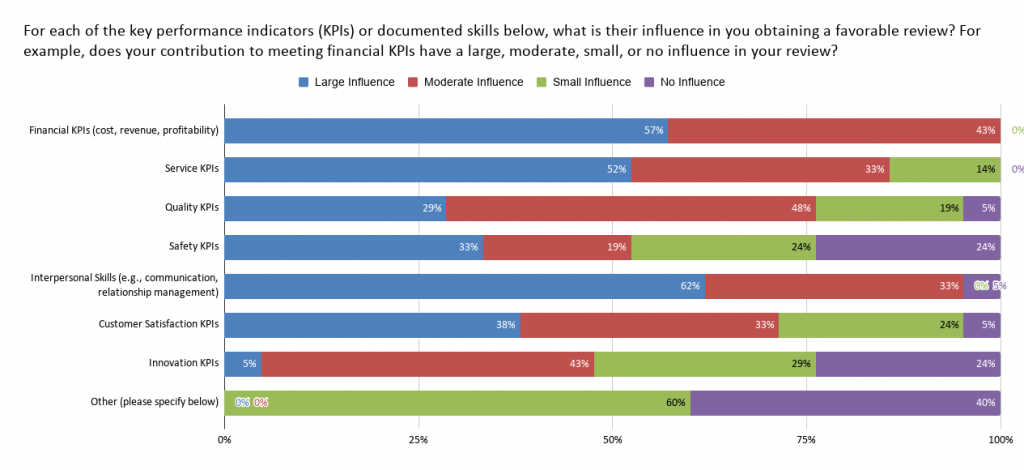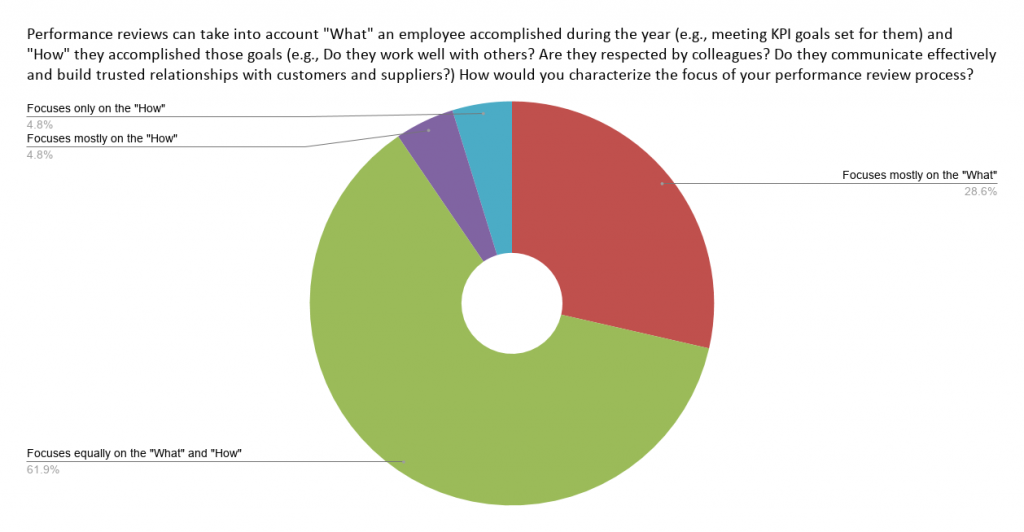In addition to yourself, who participates and provides input in conducting your performance review?
We asked our Indago research community that question back in September 2019. Not surprising, all of our Indago member respondents (100%) said that “The person I report to directly” participates and provides input in conducting their performance review.
However, it doesn’t appear that “360 degree” performance reviews – where others across the organization as well as outside the company participate and provide input – are common.

Only 25% of the respondents said that “The people I work with in my department (non-reports)” and “The people I work with in other departments” participate and provide input. Only 8% said that customers participate in the review process and 0% said external suppliers do.
Considering the collaborative nature of supply chain management, not getting input from a broader set of people, both inside and outside the company, seems like a shortcoming in the current performance review process.
Which KPIs and Skills Matter Most?
“Interpersonal skills” (62%) and “Financial KPIs” (57%) received the most votes for having a large influence on performance reviews.

Surprisingly, only 5% said that “Innovation KPIs” have a large influence on performance reviews. Maybe it’s because innovation sometimes takes a long time (at least more than a year) to translate into quantifiable business benefits. Or maybe it’s because companies like to talk about innovation, but when it comes to recognizing and rewarding employees, short-term results matter more.
Measuring the ‘What’ and ‘How’
Performance reviews can take into account “What” an employee accomplished during the year (e.g., meeting KPI goals set for them) and “How” they accomplished those goals (e.g., Did they work well with others? Are they respected by colleagues?)
We asked our Indago members: How would you characterize the focus of your performance review process?
The majority of respondents (62%) said that their performance reviews focus equally on “What” they accomplished and “How” they accomplished it.

Here are some value-added comments from our Indago members, who are all supply chain and logistics professionals from manufacturing, retail, and distribution companies:
“Annual performance reviews are antiquated and should be ended. They should be replaced with regular discussions to course correct throughout the year to align with goals and objectives.”
“At my organization, and in my role, the primary focus is on beating the assigned and fluctuating annual savings target. Some importance is put upon internal relations with departmental stakeholders and their interpretation of satisfactory work and also upon the appearance of being engaged. Some colleagues in my department have been told during their KPI review that they must improve their attitude while at work. To be fair, though, no employee should be surprised by his or her KPI review. Effective leadership should ensure that reviews of projects, work accomplished, and stakeholder satisfaction occur at least once a month. The annual KPI should just be a final tally of the information already known and tracked.”
“Performance reviews are a waste of time and energy. My staff and their reports use monthly scorecards for performance measurement. Results are available daily. ‘The best performance review is no performance review’ – Aubrey Daniels.”
“I think they’re too internally focused in my current position. I work primarily with external vendors and I wish there was more discussion about my performance from those who I work with externally.”
“I am new to this company; performance reviews have only started in the past two years. We will change the weighting to 60% ‘what’ and 40% ‘how’. Also included in the review will be a personal KPI dedicated to development and what the individual wants to do, e.g., work in other areas, outside courses, etc.”
“Yes [performance reviews] fail to capture important pieces. Our performance reviews are comprised of projects solely, they do not take into account daily workload. Others may have more bandwidth to dedicate to project work.”
“Although many organizations ‘talk’ about putting equal weight on the ‘how’ my experience is that the ‘what’ carries greater influence.”
Do you agree with the feedback and advice of our Indago members? Anything you would add? Post a comment and let us know.
Also, If you’re a supply chain or logistics practitioner from a manufacturing, retail, or distribution company, I encourage you to learn more about Indago and join our research community. It is confidential, there is no cost to join and the time commitment is minimal (2-5 minutes per week) — plus your participation will help support charitable causes like JDRF, American Logistics Aid Network, American Cancer Society, Feeding America, and Make-A-Wish.
You can also follow us on LinkedIn to stay informed of our latest research results and news.
(For related commentary, see Dump The Performance Review: A Better Way To Evaluate Supply Chain Talent.)











